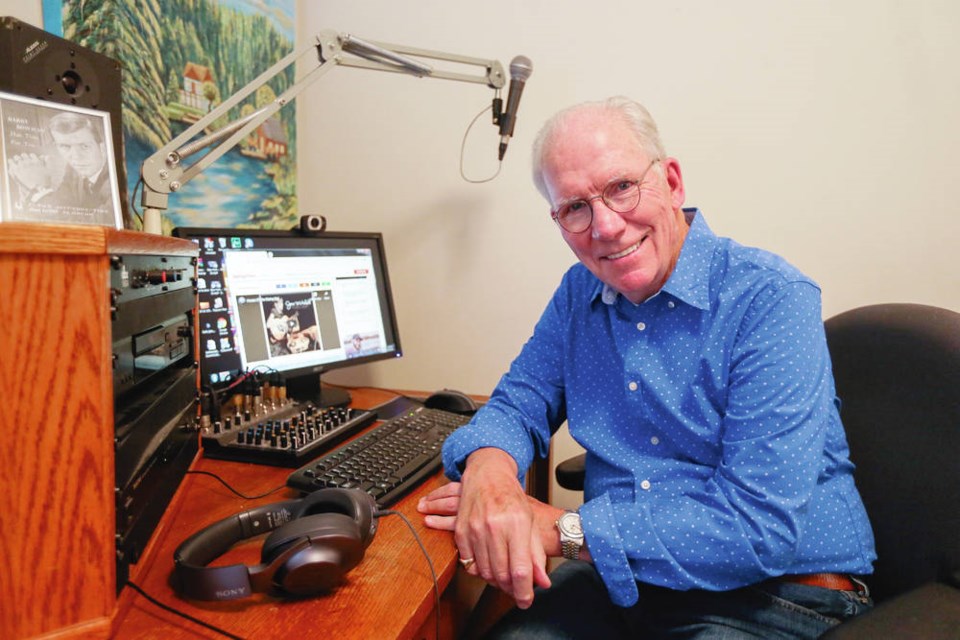Two long-forgotten tapes featuring the first recordings of Joni Mitchell have come out of storage and into circulation, thanks to a serendipitous turn of events involving retired Victoria broadcaster Barry Bowman.
Bowman, who spent three decades on air at CFAX 1070, was a disc jockey at CFQC AM in Saskatoon when he first met Mitchell in 1963. She was an inexperienced 19 year-old playing music under her given name (Joni Anderson) when Bowman brought her into the CFQC studio for an hour-long session. Nine songs were recorded that night, featuring just Mitchell and her ukulele, which she hoped to use as an audition tape to attract managers and booking agents. “I propped her on a stool, put a mic in front of her, went in the booth and put down the recording,” Bowman said.
“And that was it.”
The songs, once thought to be lost, will be made public on a forthcoming five-disc boxed set, Joni Mitchell Archives Vol. 1: The Early Years (1963-1967), which is due Oct. 30.
The story of how the music finally got into Mitchell’s hands — 55 years after the fact — is ripe for the rock ’n’ roll history books. After the 1963 recording session, the two parted ways, Bowman moving on to other jobs in radio and Mitchell relocating in Los Angeles. Bowman said he quickly misplaced his copy of the session, following a move to Regina. A spare recording of an unknown singer from Saskatoon would not have been top of mind at the time, Bowman said. “During my career, moving on from station to station, these things tend to kind of get lost.”
He would soon realize the flaws in that reasoning. When Mitchell eventually became a well-known singer, in 1968, he immediately recognized her as the girl from the Saskatoon studio. And the more famous she became, the more he bemoaned the loss of the tape. He relayed the story to friends over the years, but never had the evidence to back up his claims — that is, until his daughter discovered an old box of odds and ends in his ex-wife’s house five years ago. “I kept from time to time thinking, ‘I wonder where those tapes wound up?’ I’d obviously left them in the basement or something like that. And sure enough, [in the box] I spotted this one tape immediately. I recognized it. And then I noticed that there’s a second tape. I had not remembered that there was two tapes.”
Written on the spine of the cases: Joni Anderson.
The very first recordings by Joni Mitchell, before she was Joni Mitchell, is a significant find. Bowman’s crystal-clear recordings of Mitchell singing folk standards House of the Rising Sun and John Hardy, among others, was even more historical because these were songs she would eventually cut from her repertoire. Mitchell has often voiced her dissatisfaction over the “folk singer” part of her career, but Bowman’s tapes helped her look at the era with a new perspective. “The early stuff, I shouldn’t be such a snob against it,” Mitchell, 76, said in a statement.
“A lot of these songs, I just lost them. They fell away. They only exist in these recordings. For so long I rebelled against the term, ‘I was never a folksinger.’ I would get pissed off if they put that label on me. I didn’t think it was a good description of what I was. And then I listened and … it was beautiful. It made me forgive my beginnings.”
Immediately after the discovery, Bowman enlisted the help of local producer Dale Baglo to make a digital back-up of the tapes. What then? Bowman had come to know super-producer David Foster during his CFAX days, so he asked the Victoria native for advice on the matter. Foster put him in touch with the vice-president of the Verve label, who advised Bowman to get in touch with Mitchell directly. Email exchanges with Mitchell’s personal assistant resulted in Bowman and his wife taking a first-class trip to Beverly Hills two years ago, tapes in hand, to have dinner with Mitchell, who picked up the cost of the dinner, hotel, and flights.
Bowman preented the tapes to Mitchell in a custom-made wooden box — themed to match her 1972 album, Blue — that was made by his friend, former CFAX on-air host Barry Kennard (Mitchell, for her part, responded by giving Kennard a signed copy of the album). A deal between Mitchell and Bowman was negotiated at the dinner table, with favourable terms for both sides, Bowman said. “I never expected them to even suggest that I could have some compensation until they they mentioned that in the contract. Our thrill was the fact that I even got a chance to talk to her. We signed off the agreement. And that was that. I was happy enough to say, ‘You know what? We had this wonderful weekend on Joni.’ We’re flying back first class, and I’m thinking, that was wonderful. Never knowing that the second act was just around the corner.”
Two months ago, Mitchell’s personal assistant got back in touch with Bowman and told him a boxed set of early material was in the works. Discussions increased once Joni Mitchell Archives Vol. 1 started to take shape, which seemed strange. He had already agreed to terms, and the music was theirs to distribute. And then he was asked to hop on a call with Mitchell. To his surprise, she asked if he would like to contribute liner notes for one section of the box. He agreed, and was sent a digital proof of his notes, once the design was finalized. “She said, ‘I’m going to attach something to an e-mail that you’re going to love.”
He opened the file, and there it was: A photo of Bowman, from 1963, accompanying his recollection of their time together.



